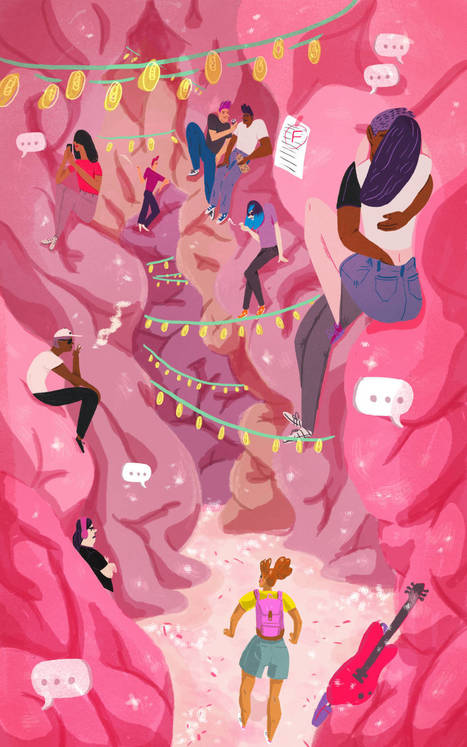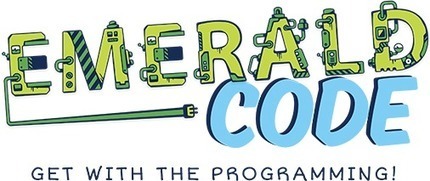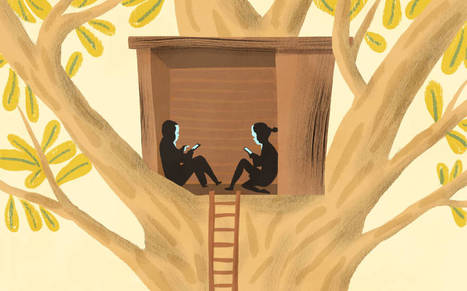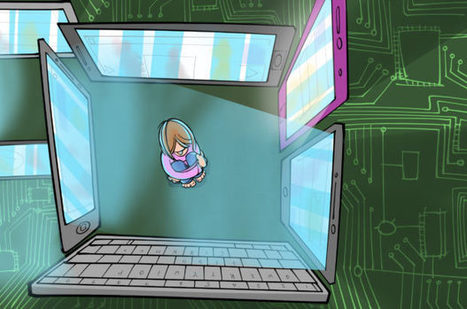 Your new post is loading...
 Your new post is loading...

|
Scooped by
John Evans
|
Facebook, not so long ago, ruled the social media roost. Across nearly all important demographics, the Zuckerberg-led time bomb flattened the competition. Sure, it was losing teens, but many of them were just being diverted to other Facebook-owned properties, like WhatsApp and Instagram.
Now, according to Pew Research, only 51 percent of teens use Facebook — down 20 percent from 2015. Zuckerberg better grab a helmet because this time the sky really is falling.
http://www.w3.org/TR/xhtml1/DTD/xhtml1-strict.dtd"> A teenage brain is a fascinating, still-changing place. There's a lot going on: social awareness, risk-taking, peer pressure; all are heightened during this period.
Until relatively recently, it was thought that the brain was only actively developing during childhood, but in the last two decades, researchers have confirmed that the brain continues to develop during adolescence — a period of time that can stretch from the middle school years into early adulthood.
"We were always under the assumption that the brain doesn't change very much after childhood," explains Sarah-Jayne Blakemore, a professor of cognitive neuroscience at University College London.
But that's simply not the case, she says, and educators — and teens themselves — can learn a lot from this.

|
Scooped by
John Evans
|
THE 3-D PRINTER in the Peabody (MA) Institute Library’s basement Creativity Lab might be what draws teens to the space, but it’s not always what they spend the most time using.
One group of boys is fascinated by the sewing machines. “They come in because of the tech, and then they get involved in the [other] things,” says Cate Merlin, teen and special projects librarian for the library’s main branch.
At Dover (AR) High School, library media specialist Janet Kanady has seen a similar response. “We came close to having enough kids knitting to form our own club,” Kanady says. As it turned out, they were more interested in an old electric typewriter. “They are completely fascinated by it.”
It’s hard to predict what will capture teens’ attention in a makerspace, so flexibility is key with this age group. Kanady also finds that a hands-off approach works best for students who use her library’s “tinker spot.” She says, “They have always amazed me on the things they come up with. Maybe that is a part of the appeal of it. They aren’t forced to do it just one way.”

|
Scooped by
John Evans
|
NERVOUS LOOKS. PASSING notes. Gossip around the lunch table. The middle school relationship is an iconic coming-of-age staple that has remained unchanged for decades. But smartphones and apps have fundamentally transformed how kids, you know, “like-like” each other. The youths of Gen Z are communicating more than any generation before them, while simultaneously cutting off human connection at the thumbs. So what does this cocktail produce? We consulted with current and recent middle-schoolers about what it’s like to “hang out” in the age of the iPhone.
Simone’s always making things to bring her fun ideas and crazy plans to life. Why not send candy to the whole school by drones, or 3-D print your science assignment? When Simone and her friends, Type-A musician and star student Lana, uber-energetic gaming enthusiast Bevan, and class cutup Jackson, ‘King Of The Meme’—aren’t hanging out in Rowat High School’s MakerSpace, they’re in constant contact on their video chat, ‘Konnect’, in a never-ending group hang. Together, they solve high school problems, make each other laugh – and crack the Emerald Code!

|
Scooped by
John Evans
|
Look up from this screen right now. Take a look around. On a bus. In a cafe. Even at a stoplight. Chances are, most of the other people in your line of sight are staring at their phones or other devices. And if they don’t happen to have one out, it is certainly tucked away in a pocket or bag.
But are we truly addicted to technology? And what about our kids? It’s a scary question, and a big one for scientists right now. Still, while the debate rages on, some doctors and technologists are focusing on solutions.
“There is a fairly even split in the scientific community about whether ‘tech addiction’ is a real thing,” says Dr. Michael Bishop. He runs Summerland, which he calls “a summer camp for screen overuse,” for teens.
|

|
Scooped by
John Evans
|
“Over the past year, there has been a deafening debate over the importance of creating tools to promote responsible technology use. In January, two of Apple’s shareholder groups asked the company to look at the addictive effects of iPhones on children. Google’s recent developer conference highlighted tools to help users better control smartphone usage. For our youngest generations, there’s certainly reason to believe that a focus on managing distractions is just as important as promoting good digital citizenship.
When I speak with middle school and high school students about organization and time management, I often begin with a simple question: How many of you would like an extra seven to 10 hours of free time per week? Nearly all hands go up, and students are quickly excited by the possibility that they could get their work done faster, understand it better, and have more time to spend on other activities, hobbies or even sleep.”

|
Scooped by
John Evans
|
http://www.w3.org/TR/xhtml1/DTD/xhtml1-strict.dtd"> A teenage brain is a fascinating, still-changing place. There's a lot going on: social awareness, risk-taking, peer pressure; all are heightened during this period.
Until relatively recently, it was thought that the brain was only actively developing during childhood, but in the last two decades, researchers have confirmed that the brain continues to develop during adolescence — a period of time that can stretch from the middle school years into early adulthood.
"We were always under the assumption that the brain doesn't change very much after childhood," explains Sarah-Jayne Blakemore, a professor of cognitive neuroscience at University College London.
But that's simply not the case, she says, and educators — and teens themselves — can learn a lot from this.

|
Scooped by
John Evans
|
Not all social apps are bad. Most of the apps our kids use are truly an extension of your child’s “real world” social life. For the most part, our kids talk to people they only talk to in “real life.” With the influence of technology in our kids social lives, we can’t panic or over think every single thing, but we do need to empower each other and be aware of what our kids are doing when they are online and engaged in these apps. We teach our children how to swim so they don’t drown and the same is true for online social behaviors. We have to talk to our kids and teach them how to navigate through this online world. I believe strongly in not blocking everything, but in my opinion, there are certain apps that are just off-limits and I will share those with you in this post. The problem in most cases is that parents just don’t know how bad some of these apps can really be. The truth is told so perfectly by Kevin Honeycutt when he says, “Our kids are growing up on a digital playground and no one is on recess duty.” So true.

|
Scooped by
John Evans
|
Simone’s always making things to bring her fun ideas and crazy plans to life. Why not send candy to the whole school by drones, or 3-D print your science assignment? When Simone and her friends, Type-A musician and star student Lana, uber-energetic gaming enthusiast Bevan, and class cutup Jackson, ‘King Of The Meme’—aren’t hanging out in Rowat High School’s MakerSpace, they’re in constant contact on their video chat, ‘Konnect’, in a never-ending group hang. Together, they solve high school problems, make each other laugh – and crack the Emerald Code!

|
Scooped by
John Evans
|
We’d all like to be a little happier.
The problem is that much of what determines happiness is outside of our control. Some of us are genetically predisposed to see the world through rose-colored glasses, while others have a generally negative outlook. Bad things happen, to us and in the world. People can be unkind, and jobs can be tedious.
An analysis of 1 million teens showed those who spent more time on the internet, playing computer games, on social media, texting, using video chat or watching TV were less happy.
But we do have some control over how we spend our leisure time. That’s one reason why it’s worth asking which leisure time activities are linked to happiness, and which aren’t.
In a new analysis of 1 million U.S. teens, my co-authors and I looked at how teens were spending their free time and which activities correlated with happiness, and which didn’t.
We wanted to see if changes in the way teens spend their free time might partially explain a startling drop in teens’ happiness after 2012 – and perhaps the decline in adults’ happiness since 2000 as well.

|
Scooped by
John Evans
|
"When teens were asked, recently, if they believe their parents know “a little” or “nothing” about what they do or say online, or even what social-media apps and sites they use, more than a quarter of them agreed.
After visiting schools around the country, it seems to me they’re likely giving their parents a bit too much credit. When I ask audiences at parent education nights how many have ever used Snapchat, Musical.ly or Tbh, few if any hands go up.
I’ve interviewed middle school and high school students about secrets they wish parents knew about their online use, but don’t necessarily want to tell them. These are three of the secrets students shared:"
|
 Your new post is loading...
Your new post is loading...
 Your new post is loading...
Your new post is loading...




















